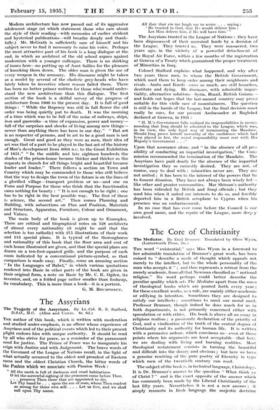The Assyrians
The Tragedy of the Assyrians. By Lt.-Col. R. S. Stafford, D.S.O., M.C. (Allen and Unwin. 8s. 6d.) THE author of this book, which is written with moderation
and studied under-emphasis, is an officer whose experience of Assyrians and of the political events which led to their present plight endows him with unique authority. It should be read by all who strive for peace, as a reminder of the paramount need for justice. The Prince of Peace was to inaugurate his reign with -Justice and with Judgement. The brave words of
the Covenant of the League of Nations recall, in the light of what actually occurred to the oldest and proudest of Eastern races and the oldest Christian Church, the bitter words of the Psalms which we associate with Passion Week : "All the earth is full of darkness and cruel habitations.
0 let the sorrowful sighing of the prisoners come before Thee. • • . preserve Thou those that are appointed to die. Let Thy hand be . . . upon the son of man, whom Thou madest so strong for thine own self. . . . Let us live, and we shall call upon Thy name All they that 5313 me laugh me to scorn . . . saying : -` He trusted in God, that He would deliver him : Let Him deliver him, if Ho will have him.'"
The Assyrians trusted in the League of Nations : they have
been dispossessed of their ancestral lands by a decision of the League. They trusted us. They were massacred, two years ago, in the vicinity of a powerful detachment of the Royal Air Force, within a few months of the registration at Geneva of a Treaty which guaranteed the proper treatment of Minorities in Iraq.
Colonel Stafford explains what happened, and why after two years these men, to whom the British Government, which used them to keep order among their neighbours and rivals—Arabs and Kurds--owes so much, are still homeless, destitute and dying. He discusses, with admirable impar- tiality, alternative solutions—Syria, Brazil, British Guiana— and holds out hopes that the last-named country may prove suitable for this virile race of mountaineers. The question is still in the hands of the League, but the final decision must really be ours, for our present Ambassador at Baghdad declared at Geneva, in 1931: "H. M.'s Government fully realized its responsibilities in recom- mending that Iraq should be admitted to the League, which was, in its view, the- only legal way of terminating the Mandate. Should Iraq prove herself unworthy of the confidence which had b3en placed in her, the moral responsibility must rest with His Majesty's Government . . ."
Upon that assurance alone, and "in the absence of all po3- sibility of conducting an impartial investigation," the Com- mission recommended the termination of the Mandate. The Assyrians have paid dearly for the absence of the impartial investigation they so earnestly desired. They are not, of course, easy to deal with : minorities never are. They are not united ; it has been to the interest of the powers that be to foment disunion. They have not always been wisely led— like other and greater communities. Mar Shimun's authority has been ridiculed by British and Iraqi officials ; but they used him when it suited our interests to do so, and forcibly deported him in a British aeroplane to Cyprus when his presence was an embarrassment.
In no case that has ever come before the Council is our own good name, and the repute of the League, more deep y involved.










































 Previous page
Previous page